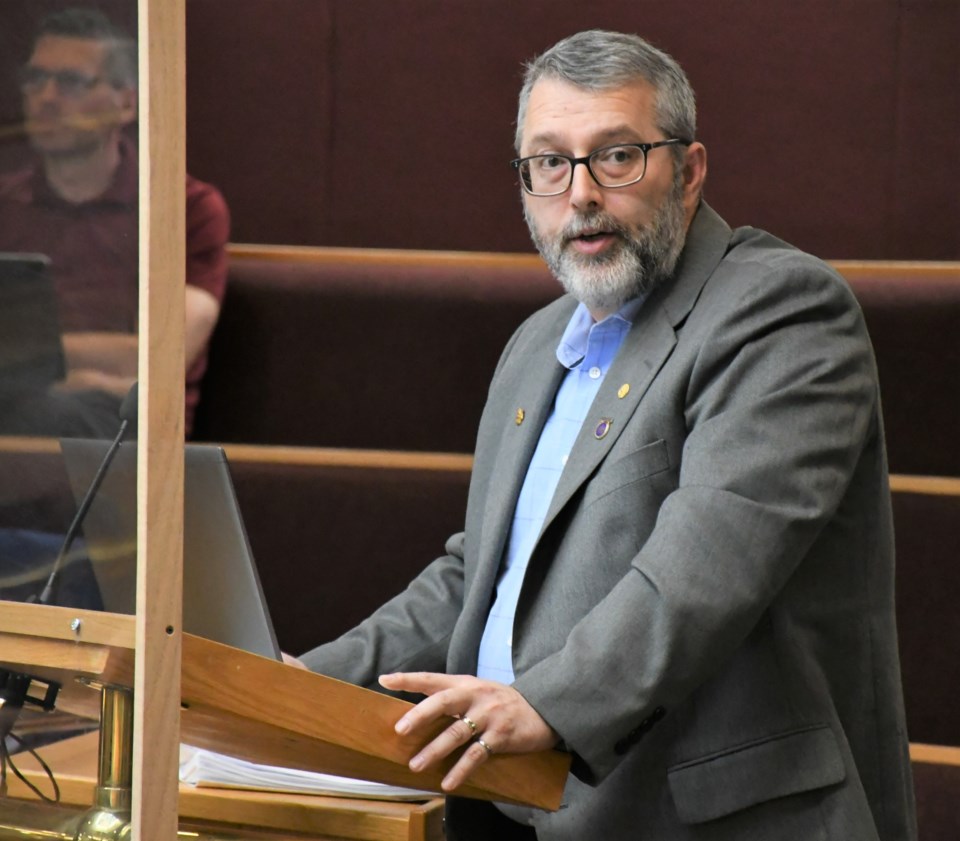TUXFORD — The Buffalo Pound Water Treatment Plant upgrade project is about three months behind schedule, but officials say it’s not facing cost overruns and has reserves to provide a cushion.
Ryan Johnson, president/CEO of the Buffalo Pound Water Treatment Corporation, presented the organization’s 2023 annual report during Moose Jaw city council’s recent regular meeting.
The renovations began in July 2022, and since then, construction has been progressing “very well,” Johnson said. The $325-million project is about 50 per cent complete, while roughly 30 per cent of revenues remain. Moreover, while the overall schedule is roughly 90 days off track, installation of the critical items is on time.
“There have been some disruptions to operations with the construction activity, but these have been mitigated by all parties,” he stated.
The corporation is facing some legal troubles over commercially sensitive equipment, but it doesn’t expect to address those issues until contractors make substantial completions to the venue, Johnson added. While the organization will face a dispute resolution process, the project should still finish by Dec. 31, 2025.
When asked about being behind schedule, the plant president/CEO said the project remains within budget and has some contingency funding available. Furthermore, cash-flow distribution will remain high for the next few months at $8 million to $10 million before slowly decreasing to $2 million to $3 million.
Council also asked Johnson to comment on the available volume of water in Lake Diefenbaker — which feeds into Buffalo Pound Lake — since there was a drought last year in southern Saskatchewan and some residents are worried about shortages.
“We pay close attention to water levels in both places,” Johnson said.
The Water Security Agency (WSA) manages water bodies across the province and controls their levels, and last winter, it added an extra metre of runoff water to Lake Diefenbaker, knowing it may not receive similar runoff volumes in the future, he continued.
This additional water has ensured that the lake can provide a full level of service across the province; the BPWTC pulls three per cent of the water from Diefenbaker into Buffalo Pound, while the rest goes to the Saskatoon area.
Buffalo Pound Lake has three years of domestic water supply available for this region, while Diefenbaker has 18 years of supply, so there is no concern about not being able to supply the major cities, said Johnson.
However, the corporation is warning that the BPWTP cannot produce full flow capacity while the plant is under construction, which is a restriction it managed — with success — last year, he continued.
“We don’t expect 2024 to be any different, but we want to make sure people are aware that if we have a long period of hot, dry weather, we may have restrictions (in place again) or ask the cities to manage that … ,” Johnson remarked.
“After this year, we should … have lots of capacity … .”
The corporation president/CEO added that there could be water available from Lake Diefenbaker for “several hundred years” if the province used that liquid for domestic purposes only.
Buffalo Pound’s surface area is 2,900 hectares/7,163 acres, which means it has a capacity of 90 million cubic metres at full supply level.
Annual highlights
Johnson’s report provided other highlights from the BPWTP’s 2023 year, such as:
- The organization installed a 1.8-megawatt solar panel system that it will commission on Tuesday, June 18
- It’s working with the WSA to address drainage issues since some area landowners’ projects could change the chemistry of Buffalo Pound Lake and affect water quality
- The Saskatchewan Construction Safety Association certified the BPWTP at the bronze level in recognition of its safety efforts; the plant’s next goal is silver certification
- The plant met all regulatory requirements to produce safe drinking water
- The organization had a planned deficit of $2 million to cover higher expenses, the removal of sludge from lagoons and lower water sales from Regina
- Reserves decreased from $74.3 million to $36 million to cover project cash flows
- The BPWTP pumped 34,020.70 megalitres of water, including 5,278.58 ML to Moose Jaw, 28,557.31 ML to Regina and 184.81 to SaskWater; sales from 2022 to 2023 declined by 0.27 per cent for Regina and increased 2.9 per cent for Moose Jaw
- Total revenues were $102,401,593 and total expenses were $23,366,907, leaving a surplus of $79,034,686, which increased the accumulated surplus to $211,611,496
- Total debt is $92.9 million, a decrease of $3,642,674 from 2022
The next regular council meeting is Monday, June 10.




